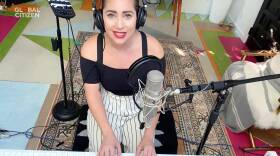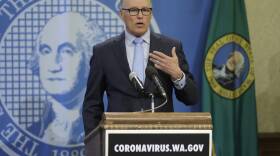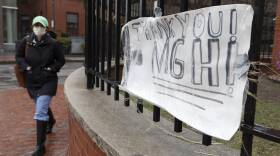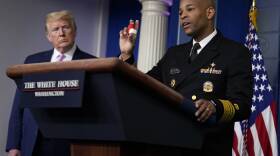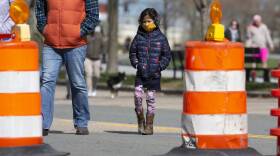EXPLORE MORE
Coming up Thursday on BPR:
Political analyst and podcaster Chuck Todd
Former secretary of public safety Andrea Cabral
Amherst College's Ilan Stavans
Environmentalist Bill McKibben
Recent segments
-
Bob Thompson Reviews 'One World: Together At Home' Simulcast
The simulcast provided some of the best entertainment in the age of coronavirus, Thompson said. -
Director Miles O'Brien Talks New Frontline Documentary 'Coronavirus Pandemic'
The new documentary looks at the different political response rates to the coronavirus pandemic. -
Dr. Vanessa Kerry On COVID-19 In Massachusetts
The state's hospitals have done well to prepare for the surge, but the national response has been mired by politics. -
Emily Rooney On The Origins Of The New Coronavirus Outbreak
Almost as soon as word of a new coronavirus outbreak that first infected people in China reached the internet, conspiracy theories about its origin spread quickly. -
Callie Crossley Weighs In On Jerome Adams Controversy: ‘It Just Didn’t Sit Well'
Crossley pushed back on the notion that drugs are the reason for higher COVID-19 cases in communities of color. -
Juliette Kayyem: 'Adaptive Recovery' Phase Of The Coronavirus
What will life after social distancing look like?
Listen to previous shows
-

Banana Ketchup, Happy Meals for Adults, and more
Award-winning food writer Corby Kummer joined Boston Public Radio on Monday to share the story of food scientist Maria Orosa, the Filipino inventor of banana ketchup. Orosa was born in Taal, Philippines, in 1893, and became a U.S. government-sponsored scholar at 23, traveling to the U.S. to earn her bachelor’s and master’s in chemistry and pharmaceutical science at the University of Washington at Seattle. Though she was offered a job by the State of Washington, Orosa returned to her native Philippines to join the government’s Bureau of Science to create a variety of new local foods and tools: flour from bananas and cassava, earthenware palayok ovens, soybean drink Soyalac, and more. Perhaps Orosa’s most beloved creation was banana ketchup. After the U.S. colonized the Philippines in 1898, imports like ketchup became expensive — and tomatoes proved hard to grow in the tropical climate. Orosa developed banana ketchup using local saba bananas, sugar, vinegar, a variety of spices, and red food coloring. “She was like the Booker T. Washington of the Philippines, finding ways of using native-grown products in the Philippines to help feed people on a much broader scale,” Kummer said. In the wide-ranging discussion, Kummer also discussed the White House Conference on Hunger, Nutrition, and Health, and McDonald’s new Happy Meal for adults. Corby Kummer is executive director of the Food and Society policy program at the Aspen Institute, a senior editor at The Atlantic and a senior lecturer at the Tufts Friedman School of Nutrition Science and Policy. -

BPR Full Show: Ask Doc KGB
Today on Boston Public Radio: The midterms are now 36 days away. We opened the lines and asked our listeners: What does an increase in political violence in America say about us? We opened our lines again for another installment of Ask the Doctor with Dr. Katherine Gergen Barnett of Boston Medical Center. She joined us on the show to answer listeners' questions from COVID to the upcoming flu season. Charlie Sennott discussed Russian President Vladimir Putin’s staged annexation of Ukrainian territories. Far-right surges in recent elections in Italy and Sweden, as well as the upcoming runoff election in Brazil. Sennott is the founder and editor of The GroundTruth Project and award-winning correspondent. Co-founder and editor of The American Prospect, Robert Kuttner joined us and discussed his new book: ‘Going Big: FDR’s Legacy, Biden’s New Deal, and the Struggle to Save Democracy.’ Revs. Irene Monroe and Emmett Price discussed nonreligious women of color gathering to talk about Christian nationalism, and Jewish tweens singing Orthodox pop songs on TikTok. Corby Kummer discussed the policy proposals coming out of the recent White House Conference on Hunger Nutrition and Health, the growth of the Boston Veg Food Fest and more. Kummer is the executive director of Food & Society at the Aspen Institute and a senior editor of The Atlantic. We closed the show with a call-in segment, and asked listeners: After knowing everything we know about McDonalds and other fast food restaurants, do you still enjoy going to these restaurants? -

BPR Full Show: Wally's Jazz and Not Tinned Fish
Today on Boston Public Radio: Hurricane Ian has left a trail of devastation. We opened the lines to listeners to ask: Has climate change won? Is it too late for some spots on the coast line, like Florida and Cape Cod? Lauren Friel and Andrew Brady from Cambridge restaurant Dear Annie discussed their recent success including reviews from the New York Times and Bon Appetit. Callie Crosley joined us through zoom and discussed the current Corey Lewandowski sexual assault case, an uptick of COVID levels in Massachusetts wastewater, and airlines that charge a premium to keep nearby seats empty. Crosley is the host of GBH’s Under the Radar. Sue O’Connell from NBC 10 Boston discussed Biden’s recent “Where’s Jackie?” moment, an HIV-positive man in Revere finally able to pursue his dream of joining the Army, and the Lizzo x James Madison collaboration. James Bennett II discussed Carly Rae Jepsen’s music with a message for the burdened adult, Japanese Breakfast, and Trevor Noah’s exit from the Daily Show after seven years. Bennett is an arts and culture reporter for GBH News. General Manager of Wally’s Cafe Jazz Club Frank Poindexter and Musicians Noah Preminger & Kevin Harris joined the show to celebrate the reopening of the jazz club. Noah and Kevin’s band Sphere 427 delighted us with some music as well. We closed the show with a call-in segment, and heard from listeners about their preferences between text messages or the ever more popular voice message. -

BPR Full Show: Physical Therapy With JB Smoove
Today on Boston Public Radio: Chuck Todd talked about the political impacts of climate change-induced severe weather, Ron DeSantis’ upcoming governor race, the latest in the Brett Favre welfare scandal. Todd is the moderator of “Meet The Press” on NBC, host of “Meet The Press Daily” on MSNBC and the political director for NBC News. Then, we asked listeners if they’ve become more judgmental post-COVID. Andrea Cabral discussed the latest in the Brett Favre welfare scandal, the potential of Ginny Thomas’s role in the Jan. 6th hearing, and new polls showing millions of Americans say they support violence to get Trump back in power. Cabral is the former Suffolk County sheriff and secretary of public safety, and former CEO of the cannabis company Ascend. J.B. Smoove talked about how he landed his Curb Your Enthusiasm role, and gave us a taste of his “Physical Therapy” tour. J.B. Smoove plays Leon Black on HBO’s Curb Your Enthusiasm. He has a show at the Wilbur Friday night. Kevin Green & Frank Lowenstein from the global climate nonprofit Rare, which recently set up their first state-wide initiative in Boston, told us about how tiny actions we take can make huge impacts on the environment. Green leads the Center for Behavior & the Environment at Rare, Lowenstein is the Senior Director of Rare. Jon Gruber gave us his insights on the “nondelegation doctrine,” a philosophy which SCOTUS justices used in last spring's case West Virginia vs. the EPA, and its wide reaching implications for things like healthcare. Gruber was instrumental in creating both the Massachusetts health-care reform and the Affordable Care Act. His latest book is “Jump-Starting America: How Breakthrough Science Can Revive Economic Growth and the American Dream.” We ended the show by asking listeners if they are taking small actions to help the environment. -

BPR Full Show: A Shambolic Mess
Today on Boston Public Radio: We opened the show by hearing from listeners about Hurricane Ian baring down on Florida's gulf coast, and how climate change is making storms more extreme. Medical ethicist Art Caplan discussed medical transparency for people seeking political office, Biogen's results from a clinical trial of a drug they're developing that aims to slow the progression of Alzheimer's disease. Caplan is the Drs. William F and Virginia Connolly Mitty Professor and founding head of the Division of Medical Ethics at NYU School of Medicine in New York City. Congressman Jim McGovern called into the show from the White House Conference on Hunger, Nutrition, and Health to discuss the administration's efforts to end hunger in the United States. Tom Nichols discussed Russia's conscription and the latest developments in the war in Ukraine. Nichols is a staff writer at The Atlantic, where he writes the Peacefield newsletter. Matt Gertz discussed how right-wing media has been covering the January 6 committee hearings, and what to expect around the upcoming midterm elections. Gertz is a senior fellow at Media Matters. Shirley Leung discussed ballot questions before voters this November, including the Fair Share Amendment and one involving dental insurers. Leung is a business columnist at the Boston Globe. We closed the show by talking with listeners about lingering stigma around imbibing in marijuana around their children.

